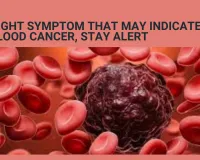A groundbreaking Nature study from July 2025
LifeStyle

Spanish researchers discovered that gut bacteria produce a molecule—imidazole propionate—that directly causes atherosclerosis, not just contributes to it.
The risk of heart disease is increasing rapidly these days. Bad eating habits and unhealthy lifestyle are considered responsible for this, but a recent research shows that heart disease can also be related to bacteria. Scientists found that the fatty plaque deposited in the heart's veins has a layer of bacteria.
In today's time, heart diseases are also increasing rapidly. Earlier this disease was seen in older people, but now the risk of this disease has increased in the youth as well. In America, the cause of death of most people is heart disease. This disease can happen to anyone. Till now it was considered a disease that does not spread through any germ (like virus or bacteria).
But a new research done recently has shown that heart disease can also be related to bacteria. Scientists from Oxford University, Finland's Tampere and Oulu Universities and the Finnish Institute for Health and Welfare have done a research together. This research has been published in the Journal of the American Heart Association.
What is the reason
According to this research, a layer of bacteria (biofilm) has been found in the fatty plaque that accumulates in the heart's veins. This discovery has shocked everyone, which was understood till now about coronary artery disease (CAD) and heart attack. This research can help in the diagnosis, treatment and even making vaccines for these diseases in the future.
What is the function of coronary artery?
Heart attack is caused by coronary artery disease. Actually, coronary arteries are those veins that supply blood and essential nutrition to our heart. When plaque (deposition of fat, cholesterol and other things) starts accumulating in these veins, then these veins get blocked. Due to this, the heart does not get enough blood and oxygen and the risk of heart attack increases.
According to the Centers for Disease Control and Prevention, these reasons can be responsible for coronary artery disease-
High blood pressure
High cholesterol
Diabetes
Obesity
History of heart disease in the family
Unhealthy lifestyle (such as smoking)
Lack of workout
Till now, bacteria was rarely mentioned in these reasons, but new research shows that bacteria can also play a big role in the formation of plaque.
Survey done on 121 people
Let us tell you that scientists checked the arteries of 121 people who died of a sudden heart attack. Along with this, 96 such patients were examined who had recently undergone surgery. This investigation revealed that layers of bacteria were present in the dirt accumulated in the arteries (called plaque). Some of these bacteria were dormant.
These bacteria cause inflammation
These bacteria escape the body's immunity and medicines. When something wakes them up, they start growing rapidly. This causes inflammation in the body. This inflammation can break down plaque, which causes blood clots and can lead to a heart attack. DNA testing revealed that these bacteria enter through the mouth, lungs, intestines and skin. This means that these common bacteria living in our body can also sometimes cause inflammation for a long time.
Can a vaccine be made?
Scientists say that a vaccine can be made to prevent heart attacks. Researchers have found DNA of many types of bacteria in the plaque (deposition of fat and cholesterol) deposited in the veins of the heart. This research is also important because if the role of bacteria is proven, then in the future a vaccine can be made to prevent heart disease and heart attack, just like the ones made for other infectious diseases.


5.png)


3.png)
.png)
3.png)
3.png)
.png)
.png)
